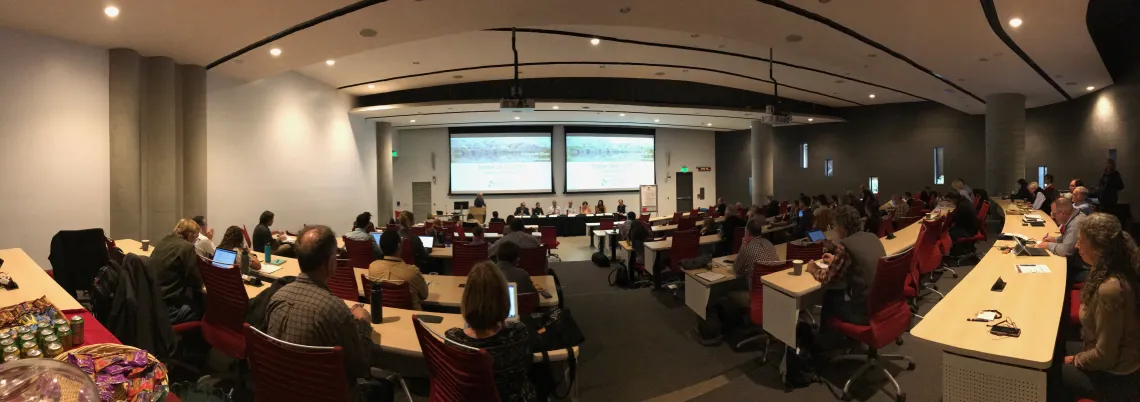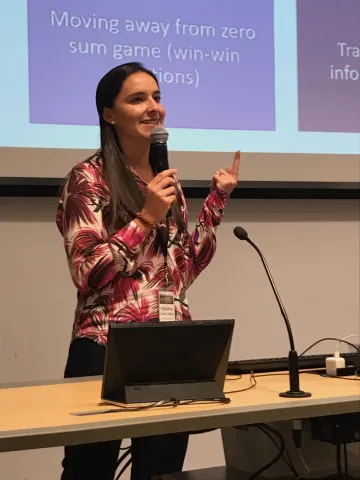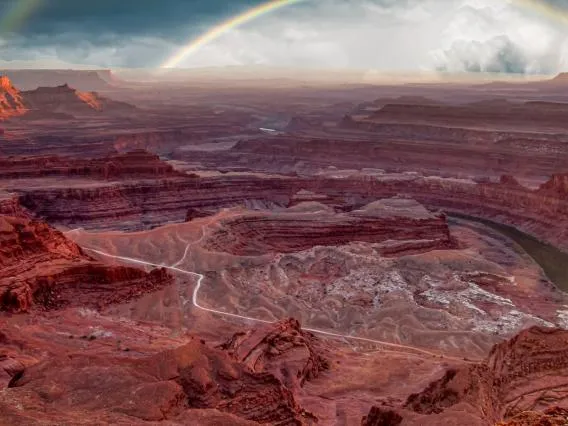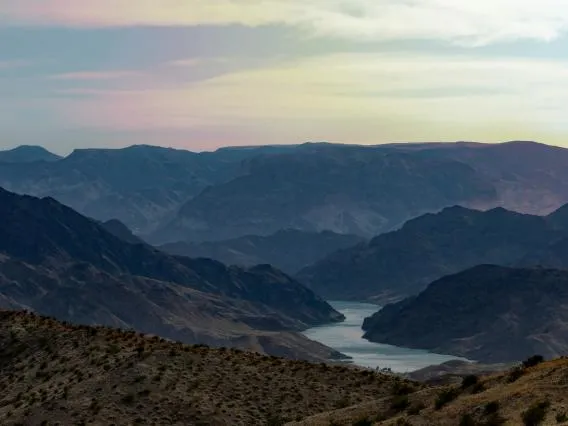Integrating Science
and Identifying Solutions
Lead CCASS Contact: Kathy Jacobs
Colorado River Conversations Program
The Colorado River provides a partial water supply for nearly 40 million people in the seven Basin States and Mexico and is considered the lifeblood of the southwestern US. This highly managed river system has been transformed historically by engineering, and now by climate changes that eclipse forecasted impacts. Sustainability of hydrologic, ecological, economic and environmental resources is threatened. A renegotiation of the Interim Guidelines for Lower Basin Shortages and Coordinated Operations for Lake Powell and Lake Mead must be complete by 2026.
The Colorado River Conversations (CRC) Program facilitates interdisciplinary, science-based conversations to contribute ideas for future management of the Colorado, setting the stage for Guideline renegotiations. CRC is a convener of people, ideas, and processes related to hydrology and climate science research, and the interests and potential roles of water users in the basin. CRC’s efforts have included conferences, workshops, scenario planning, stakeholder engagement pilot projects, and support of graduate student research on Colorado River collaboration and stakeholder engagement. Colorado River Conversations has been a collaborative effort between CCASS and Martin & McCoy LLC, with projects funded by the National Science Foundation, the Walton Family Foundation, the Janet Quinney Lawson Foundation, the Speer Family Foundation, and the Bureau of Reclamation.
Program Team Members:
- Kathy Jacobs, CCASS, University of Arizona
- Andrea Gerlak, University of Arizona
- Amy McCoy, AMP Insights
- Season Martin, Virga Labs
- Amanda Leinberger, CCASS, University of Arizona
- Anna Murveit, University of Arizona
- Mariana Rivera-Torres, Environmental Defense Fund

Colorado River Conversations Conference, October 2019
CRC's Goals and Projects
GOALS |
PROJECTS |
|---|---|
| Develop broad, interdisciplinary science agenda for Guideline renegotiations | 2017 Workshop |
| Support use of existing knowledge from western science and traditional ecological knowledge by decision-makers |
2018 Workshop 2020 Extremes Paper |
| Encourage inclusive discussions on the future of Colorado River management |
2019 CRC Conference 2019 Masters Project, Mexico’s Evolving Role in Colorado River Governance 2021 Collaborative Research Report and Masters Project, Explorations of Methods and Tools to Enhance Stakeholder Engagement in the Colorado River Basin |
| Consider the implications of worst-case scenarios | 2019-2020 Scenario Planning Process |
Explorations of Methods and Tools to Enhance Stakeholder Engagement in the Colorado River Basin
This collaborative research project between the staff of the Bureau of Reclamation, faculty and students from the University of Arizona, and Martin & McCoy LLC was designed to explore and identify ways to enhance and improve stakeholder engagement when addressing Colorado River issues. The project involved a comprehensive exploration of online tools for promoting engagement as well as scoping, design, implementation, and evaluation of two pilot strategies and tools: 1) a Comment Form to facilitate online responses to Reclamation’s 7.D. Review Draft Report, and 2) the Intra-Basin Stakeholder Discussion on Zoom that was intended to garner further stakeholder input on the 7.D. Review Draft Report and allow all of the participants to hear each other’s comments.
In the final report, the Project Team reviewed an array of online tools and engagement strategies, and identified important opportunities. They include the strong foundation of credibility and trust that Reclamation has built, which is a platform it can use to innovate and expand the collaborative culture in the Basin, and the potential of technology to enhance stakeholders’ experience in engaging in public processes. Investments to provide access via capacity building and proactive information sharing, can result in higher levels of engagement. Important considerations include expanding access to information related to renegotiations, the importance of adequate engagement resources, and ensuring that stakeholders understand process constraints.
Colorado River Conversations Conference (2019)
The Colorado River Conversations Conference, held in Tucson on October 28-30, 2019, brought together 110 citizens of the Colorado River Basin. Participants included people from all seven basin states, Mexico, and six Tribal Nations. The goal of the workshop was to convene conversations and providing a gathering ground for researchers, practitioners, and stakeholders who seek innovative ideas for managing the Colorado River’s services by:
- Presenting the current state of hydrological, ecological, social, and climate science
- Sparking conversations about management objectives, operations of the Colorado River as a system, and preparing for extreme events
- Generating and discussing alternative approaches to river management for consideration
- Respecting cultural and spiritual values
Virtually all participants spoke about managing the river as a system and advocated for increased attention to social and physical sciences to design new management systems. Heading toward 2026, participants emphasized the need to expand the conversation beyond shortage guidelines and reservoir operations so as not to miss an important window of opportunity to address a variety of important issues. Read the full conference report here.
Colorado River Basin-wide Scenario Planning (2019-2020)
The Colorado River basin-wide scenario planning process consisted of three workshops over a 10-month period (June 2019-April 2020). With the help of an advisory committee, organizers identified experts in all seven basin states, including those from water utilities, agriculture, water user associations, academia, NGOs, tribes and Mexico. About 30 participants attended each workshop.
The overarching goal of the scenario planning workshops was to explore the areas of uncertainty outside the parameters of most planning discussions, particularly extreme climate conditions such as extreme drought, megafloods, as well as social, economic, environmental, and political/governance extremes. The aim was to collectively co-create a broad set of scientifically supported “what if” storylines, explore implications, and develop low-regrets solutions across storylines.

Mexico’s Evolving Role in Colorado River Governance
CCASS sponsored the Master’s Project of Mariana Rivera-Torres (pictured), a recent graduate of the MS Water, Society, and Policy program who earned the School of Natural Resources and Environment’s “Best Thesis” award!
Mariana conducted research on recent trends in binational collaboration in the Colorado River Basin to better understand the evolution of Mexico’s role in river basin governance from 2000-2019. Her research relies on a review of recent academic scholarship, reports, and binational agreements, as well as interviews with 22 U.S. and Mexican key actors in the Colorado River binational relationship, representing federal, state, NGO, water users, and academic institutions.
Findings highlight an ebb and flow of conflict and cooperation, centered around the Colorado River Joint Cooperation Process (CRJCP) in 2008, and provide 10 lessons learned. Overall, the binational relationship has evolved towards greater collaboration, as both countries aim to move beyond a historically bilateral water management approach into an integrated regional management system. Post-2008, trust has been generated and strengthened, and Mexico has shifted from a passive to an active role in Colorado River governance.
Recent Publications

June 2022 JAWRA Article
The Press and Pulse of Climate Change: Extreme Events in the Colorado River Basin

July 2021 Collaborative Research Report
Exploration of Methods and Tools to Enhance Stakeholder Engagement in the Colorado River Basin

Additional CCASS Publications:
- International Environmental Agreements Article: Evolving together: Transboundary Water Governance in the Colorado River Basin (May 2021)
- Climatic Change Article: Scenario Planning: Embracing the Potential for Extreme Events in the Colorado River Basin (March 2021)
- Eos Article: Reimagining the Colorado River by Exploring Extreme Events (November 2020)

